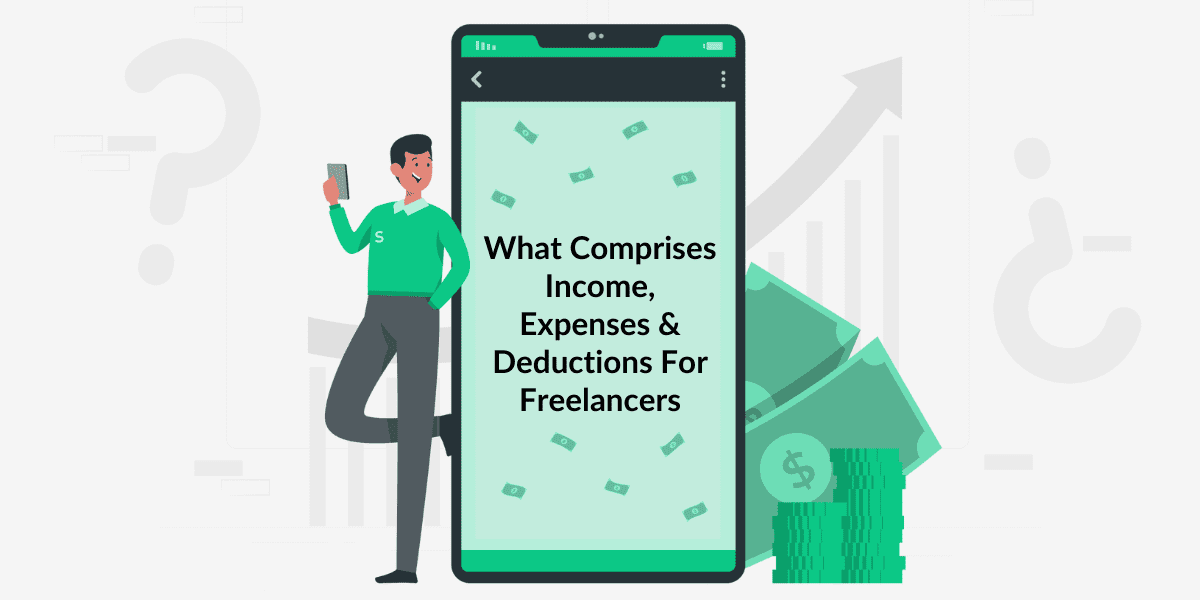Know What Comprises Income, Expenses & Deductions For Freelancers
admin
May 17, 2022

In our previous articles, we covered how filing ITR can be beneficial for freelancers in so many ways. We also covered some basics of taxation for freelancers, including a <simple way to calculate taxable income and tax payable>. In this context, we threw light on three terms – income, expenses and deductions. Let us dive deeper into these terms and understand them better in this piece.
Income:
Income can be further classified into various sub-types.
Professional income: As a freelancer, you usually get hired by a company or an individual to work on a specific assignment for a specific term. Similar for coaches; clients approach you to learn from your services – either through a one-time workshop or a fixed period of recurring sessions. You get paid upon completion of the work or delivery of your service. The money you make at the end of the assignment is categorized as ‘Professional Income’ for you. To reiterate what we covered in a previous article, as per applicable tax laws in India, income is anything you earn as a result of exercising your intellectual or manual skills. This could include income from international clients as well.
Business income: In our <3-step hyper freelance model> piece, we threw light on how you can package your knowledge and create an additional income channel for yourself by uploading courses online, owned and delivered by you. When your TG signs up for your course, you get paid for your digital product. This is categorized as ‘Business Income’. All affiliate sales and advertising revenues you earn by running promos through Google Adsense is also an example of business income.
Salaried Income: Any income paid to you on a recurring basis by an employer is categorized as ‘Salaried Income’. In this case, you are on a specific company’s payroll.
Other income: Income earned in the form of interest on savings account or fixed deposit, income earned on renting out your property or through capital gains on sale of property, income from trading in stock markets, or any other income earned through different sources in the financial year counts as ‘Other Income’ or ‘Income from Other Sources’
Expenses: As a freelancer, knowing exactly what you can claim as your expenses is crucial when it comes to calculating your tax payable. Being a freelancer means that you need to regularly spend and invest in order to upskill and grow your business. But let’s look at specific spends that you can claim as ‘Expenses’ when it comes to your tax filing.
- Upskilling through online courses, certifications, or specialized workshops
- Expenditure on office supplies
- Money spent on renting out a property or space to carry out your freelancing work, or expenses made towards working out of a co-working space
- Payments to other freelance consultants related to your business
- Food and hospitality related expenses that are incurred for official purposes
- Expenses incurred on travel for official meetings or assignments
Deductions:
‘Deductions’ is a component that encourages you to make tax-saving investments, helping you reduce your overall tax burden.
There are many tax-saving investment schemes that are applicable to freelancers, and some of the most common ones are:
- Public Provident Fund (PPF) – This is a risk-free investment option that you can claim as deductions under Section 80 C of the Income Tax Act. 1961
- ELSS or Mutual Fund: If you have an appetite for risk, mutual fund investments is another option when it comes to claiming deductions under Section 80C
- National Pension Scheme (NPS) – One can claim tax benefits upto Rs. 50,000 by investing in the National Pension Scheme. Another benefit of NPS is that you begin investing towards securing your post working years.
- Health Insurance – Medical insurance premium can be claimed as a deduction under Section 80D of the Income Tax Act, 1961. However, maximum deduction that is allowed is Rs. 25,000, and Rs. 50,000 for senior citizens.
- Interest on Home loan – This is a big tax saving instrument for freelancers. It is deductible up to Rs. 2 lacs in a year, and Rs. Rs 2.5 lacs if you own only one house
- Contribution to charitable organisations – Another major tax saving instrument, contributions to specific charities and relief funds are fully tax-deductible as per applicable tax laws in India.
We hope that you have a much better understanding of what comprises Income, Expenses & Deductions. As a freelancer, your expenses and investments can help you save tax upto Rs. 2 lacs, or even more. More importantly, investing is also a pathway to securing your future.


